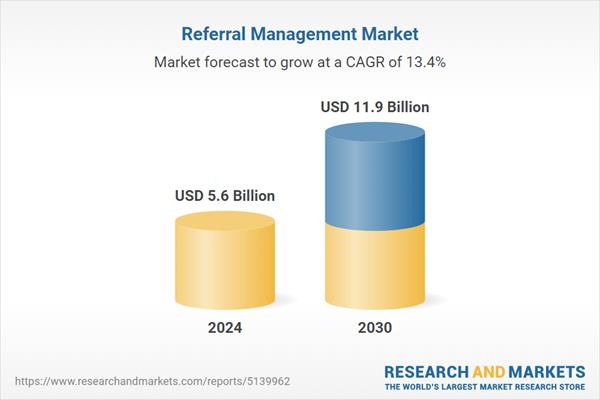Global Referral Management Market - Key Trends and Drivers Summarized
Referral Management: Optimizing Patient Care Coordination
Referral management is a critical component in the healthcare ecosystem, ensuring that patients receive timely and appropriate care across different healthcare providers. Effective referral management systems streamline the process of directing patients from primary care physicians to specialists or other healthcare services, thereby improving care coordination and patient outcomes. These systems help healthcare providers manage the referral process efficiently by tracking patient progress, ensuring timely communication between providers, and reducing delays in care. With the increasing complexity of patient care and the need for specialized treatments, referral management systems play a vital role in optimizing the healthcare delivery process, reducing unnecessary tests and procedures, and ultimately enhancing the quality of care that patients receive.What Technological Advancements Are Enhancing Referral Management Systems?
Technological advancements are significantly enhancing referral management systems, making them more efficient, integrated, and user-friendly. The adoption of electronic health records (EHRs) has revolutionized the way referral data is managed and shared, enabling seamless communication between healthcare providers. EHR-integrated referral management systems allow for the automatic transfer of patient information, ensuring that specialists have access to all relevant medical history and test results. Additionally, the integration of artificial intelligence (AI) and machine learning algorithms into referral management systems is improving decision-making by analyzing patient data and recommending the most appropriate specialist based on the patient's condition. Telemedicine platforms are also being incorporated into referral management systems, allowing patients to consult with specialists remotely, further enhancing the accessibility and efficiency of care. These technological advancements are making referral management systems more effective in improving patient care coordination and reducing administrative burdens on healthcare providers.What Are the Key Benefits of Implementing Referral Management Systems?
Implementing referral management systems offers numerous benefits to healthcare providers and patients alike. One of the primary advantages is the improvement in patient care coordination, as these systems ensure that referrals are tracked, managed, and completed in a timely manner. This reduces the risk of patients falling through the cracks and ensures that they receive the care they need when they need it. Additionally, referral management systems help reduce administrative costs by automating many of the manual processes associated with managing referrals, such as scheduling appointments, transferring patient records, and following up with patients. By providing healthcare providers with real-time data and analytics, these systems also enable better decision-making and improve overall efficiency. For patients, referral management systems enhance the care experience by reducing wait times, improving communication, and ensuring that they are connected with the right specialists quickly and efficiently. These benefits make referral management systems an essential tool in modern healthcare.What Factors Are Driving the Growth in the Referral Management Market?
The growth in the Referral Management market is driven by several factors. The increasing demand for better care coordination in an increasingly complex healthcare environment is a significant driver, as healthcare providers seek to improve patient outcomes and reduce costs. Technological advancements, particularly in EHR integration, AI, and telemedicine, are also propelling market growth by making referral management systems more efficient, user-friendly, and effective. The rising prevalence of chronic diseases and the need for specialized care are further boosting demand for referral management systems, as these conditions often require coordinated care across multiple providers. Additionally, regulatory requirements and the push towards value-based care are contributing to market growth, as healthcare organizations are incentivized to adopt systems that improve care coordination and patient outcomes. These factors, combined with the increasing adoption of digital health technologies, are driving the sustained growth of the Referral Management market.Report Scope
The report analyzes the Referral Management market, presented in terms of market value (USD). The analysis covers the key segments and geographic regions outlined below.- Segments: Component (Software, Services); Type (Inbound Referrals, Outbound Referrals); Deployment (Cloud, On-Premise); End-Use (Providers, Payers, Other End-Uses).
- Geographic Regions/Countries: World; United States; Canada; Japan; China; Europe (France; Germany; Italy; United Kingdom; and Rest of Europe); Asia-Pacific; Rest of World.
Key Insights:
- Market Growth: Understand the significant growth trajectory of the Referral Management Software segment, which is expected to reach US$7.5 Billion by 2030 with a CAGR of 14.1%. The Referral Management Services segment is also set to grow at 12.3% CAGR over the analysis period.
- Regional Analysis: Gain insights into the U.S. market, valued at $1.5 Billion in 2024, and China, forecasted to grow at an impressive 12.4% CAGR to reach $1.8 Billion by 2030. Discover growth trends in other key regions, including Japan, Canada, Germany, and the Asia-Pacific.
Why You Should Buy This Report:
- Detailed Market Analysis: Access a thorough analysis of the Global Referral Management Market, covering all major geographic regions and market segments.
- Competitive Insights: Get an overview of the competitive landscape, including the market presence of major players across different geographies.
- Future Trends and Drivers: Understand the key trends and drivers shaping the future of the Global Referral Management Market.
- Actionable Insights: Benefit from actionable insights that can help you identify new revenue opportunities and make strategic business decisions.
Key Questions Answered:
- How is the Global Referral Management Market expected to evolve by 2030?
- What are the main drivers and restraints affecting the market?
- Which market segments will grow the most over the forecast period?
- How will market shares for different regions and segments change by 2030?
- Who are the leading players in the market, and what are their prospects?
Report Features:
- Comprehensive Market Data: Independent analysis of annual sales and market forecasts in US$ Million from 2024 to 2030.
- In-Depth Regional Analysis: Detailed insights into key markets, including the U.S., China, Japan, Canada, Europe, Asia-Pacific, Latin America, Middle East, and Africa.
- Company Profiles: Coverage of players such as Allscripts Healthcare Solutions, Inc., Cerner Corporation, Eceptionist, Inc., Ehealth Technologies, Inc., Harris Corporation and more.
- Complimentary Updates: Receive free report updates for one year to keep you informed of the latest market developments.
Some of the 42 companies featured in this Referral Management market report include:
- Allscripts Healthcare Solutions, Inc.
- Cerner Corporation
- Eceptionist, Inc.
- Ehealth Technologies, Inc.
- Harris Corporation
- Kyruus, Inc.
- McKesson Corporation
- Referralmd
- The Advisory Board Company
This edition integrates the latest global trade and economic shifts into comprehensive market analysis. Key updates include:
- Tariff and Trade Impact: Insights into global tariff negotiations across 180+ countries, with analysis of supply chain turbulence, sourcing disruptions, and geographic realignment. Special focus on 2025 as a pivotal year for trade tensions, including updated perspectives on the Trump-era tariffs.
- Adjusted Forecasts and Analytics: Revised global and regional market forecasts through 2030, incorporating tariff effects, economic uncertainty, and structural changes in globalization. Includes historical analysis from 2015 to 2023.
- Strategic Market Dynamics: Evaluation of revised market prospects, regional outlooks, and key economic indicators such as population and urbanization trends.
- Innovation & Technology Trends: Latest developments in product and process innovation, emerging technologies, and key industry drivers shaping the competitive landscape.
- Competitive Intelligence: Updated global market share estimates for 2025, competitive positioning of major players (Strong/Active/Niche/Trivial), and refined focus on leading global brands and core players.
- Expert Insight & Commentary: Strategic analysis from economists, trade experts, and domain specialists to contextualize market shifts and identify emerging opportunities.
Table of Contents
Companies Mentioned (Partial List)
A selection of companies mentioned in this report includes, but is not limited to:
- Allscripts Healthcare Solutions, Inc.
- Cerner Corporation
- Eceptionist, Inc.
- Ehealth Technologies, Inc.
- Harris Corporation
- Kyruus, Inc.
- McKesson Corporation
- Referralmd
- The Advisory Board Company
Table Information
| Report Attribute | Details |
|---|---|
| No. of Pages | 273 |
| Published | February 2026 |
| Forecast Period | 2024 - 2030 |
| Estimated Market Value ( USD | $ 5.6 Billion |
| Forecasted Market Value ( USD | $ 11.9 Billion |
| Compound Annual Growth Rate | 13.4% |
| Regions Covered | Global |








